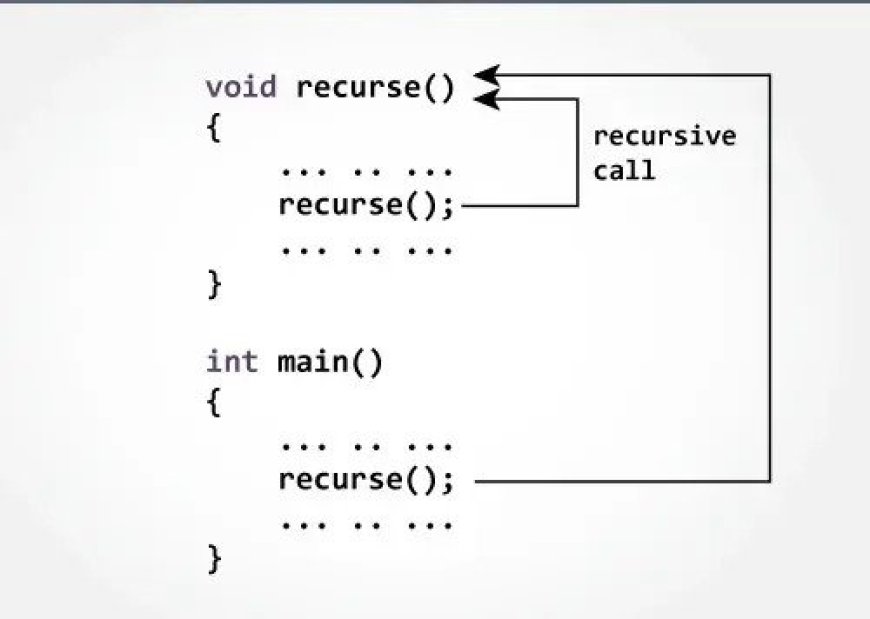Recursion in C
Recursion is a technique where a function calls itself in order to solve a problem. It is a common concept in computer science

Recursion is a powerful programming technique where a function calls itself to solve a problem. It can be a bit tricky to grasp at first, but once you understand the concept, it becomes a valuable tool for solving complex problems. In this tutorial, we'll explore recursion in C language with detailed explanations and examples.
1. Introduction to Recursion
Recursion is a technique where a function calls itself in order to solve a problem. It is a common concept in computer science and is used to solve problems that can be broken down into smaller, similar sub-problems. Recursive functions have two main parts: the base case and the recursive case.
2. The Three Laws of Recursion
To successfully implement recursion, you must follow three fundamental laws:
2.1. A Recursive Algorithm Must Have a Base Case
The base case is a condition that determines when the recursion should stop. Without a base case, the recursive function would keep calling itself indefinitely, resulting in a stack overflow.
2.2. A Recursive Algorithm Must Change Its State and Move Towards the Base Case
In each recursive call, the problem should become smaller or simpler in some way. This ensures that the function eventually reaches the base case.
2.3. A Recursive Algorithm Must Call Itself (Recursively)
The recursive function must call itself to solve a smaller version of the problem. This is the essence of recursion.
3. Base Case and Recursive Case
To illustrate these concepts, let's look at a simple example: calculating the factorial of a number.
3.1. Factorial Calculation
The factorial of a non-negative integer n (denoted as n!) is the product of all positive integers less than or equal to n. For example, 5! = 5 * 4 * 3 * 2 * 1 = 120.
Recursive Algorithm:
int factorial(int n) {
// Base case: if n is 0 or 1, return 1
if (n == 0 || n == 1) {
return 1;
}
// Recursive case: multiply n by factorial of (n-1)
else {
return n * factorial(n - 1);
}
}
In this example:
- Base Case: When
nbecomes 0 or 1, the function returns 1. - Recursive Case: Otherwise, it calculates
n * factorial(n - 1).
4. Examples of Recursive Functions
Let's explore more examples of recursive functions.
4.2. Fibonacci Sequence
The Fibonacci sequence is a series of numbers where each number is the sum of the two preceding ones. It starts with 0 and 1, and the sequence continues as 0, 1, 1, 2, 3, 5, 8, 13, ...
Recursive Algorithm:
int fibonacci(int n) {
// Base case: if n is 0 or 1, return n
if (n == 0 || n == 1) {
return n;
}
// Recursive case: calculate fibonacci(n-1) + fibonacci(n-2)
else {
return fibonacci(n - 1) + fibonacci(n - 2);
}
}
4.3. Tower of Hanoi
The Tower of Hanoi is a classic puzzle that involves moving a stack of disks from one peg to another, with the constraint that a larger disk cannot be placed on top of a smaller one.
Recursive Algorithm:
void towerOfHanoi(int n, char source, char auxiliary, char destination) {
// Base case: If there's only one disk, move it from source to destination
if (n == 1) {
printf("Move disk 1 from %c to %c\n", source, destination);
return;
}
// Move n-1 disks from source to auxiliary using destination as a helper peg
towerOfHanoi(n - 1, source, destination, auxiliary);
// Move the remaining disk from source to destination
printf("Move disk %d from %c to %c\n", n, source, destination);
// Move the n-1 disks from auxiliary to destination using source as a helper peg
towerOfHanoi(n - 1, auxiliary, source, destination);
}
5. Advantages and Disadvantages of Recursion
Advantages:
- Elegant and intuitive for solving problems that have a recursive structure.
- Can simplify code by breaking complex problems into smaller sub-problems.
- Useful for tasks such as tree traversal and divide-and-conquer algorithms.
Disadvantages:
- Recursive functions can consume a lot of memory due to the call stack.
- Performance may suffer for large input values.
- Debugging recursive code can be challenging.
6. Tips for Using Recursion in C
- Always define a base case to prevent infinite recursion.
- Make sure each recursive call reduces the problem size or complexity.
- Use recursion when it simplifies the problem-solving process.
- Consider iterative solutions for cases where performance or memory usage is critical.

 HSingh
HSingh